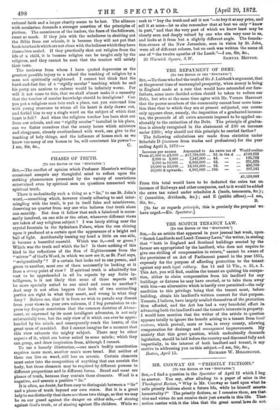THE REPAYMENT OF DEBT.
[TO THE EDITOR OF THE "SPECTATOR.")
those who feel the truth of Sir J. Lubbock's argument, that at the present time of unexampled prosperity, when money is being in England made at a rate that would have astounded our fore- fathers, some more decided action should be taken to reduce our- Debt, but who at the same time agree with Mr. Vernon Harcourt that the poorer members of the community cannot bear more taxa- tion than that to which they are at present subjected, one course- only appears clear, namely, the imposition of a graduated income- tax, the proceeds of all extra amounts imposed to be applied un- alterably to the extinction of the Debt. The principle of gradua- tion is already recognised in the abatement of £80 on incomes- under £300 ; why should not this principle be carried farther?
The following calculations are made from statistics under Schedule D (incomes from trades and professions) for the year- ending April 5, 1870 :—
Incomes per annum Amounted to
An extra tax of Would realize= From £1,000 to £3,000 ... £17,788,000 2d. in the £ ... £148,233 3,000 to 5,000 ... 7,547,000 4d. — 125,783 5,000 to 10,000 ... 8,865,000 ... 6d. — 221,625.
10,000 to 50,000 13,101,000 ... 8d. ... 436,700- 50,000 & upwards.. 4,981,000 ... 10d. — ... 207,541 £1,139,882 From this total would have to be deducted the extra tax on incomes of Railways and other companies, and to it would be added the extra tax raised under schedules A (lands, tenements, &c.) i. C (annuities, dividends, &c.) ; and E (public offioes).—I am,


































 Previous page
Previous page